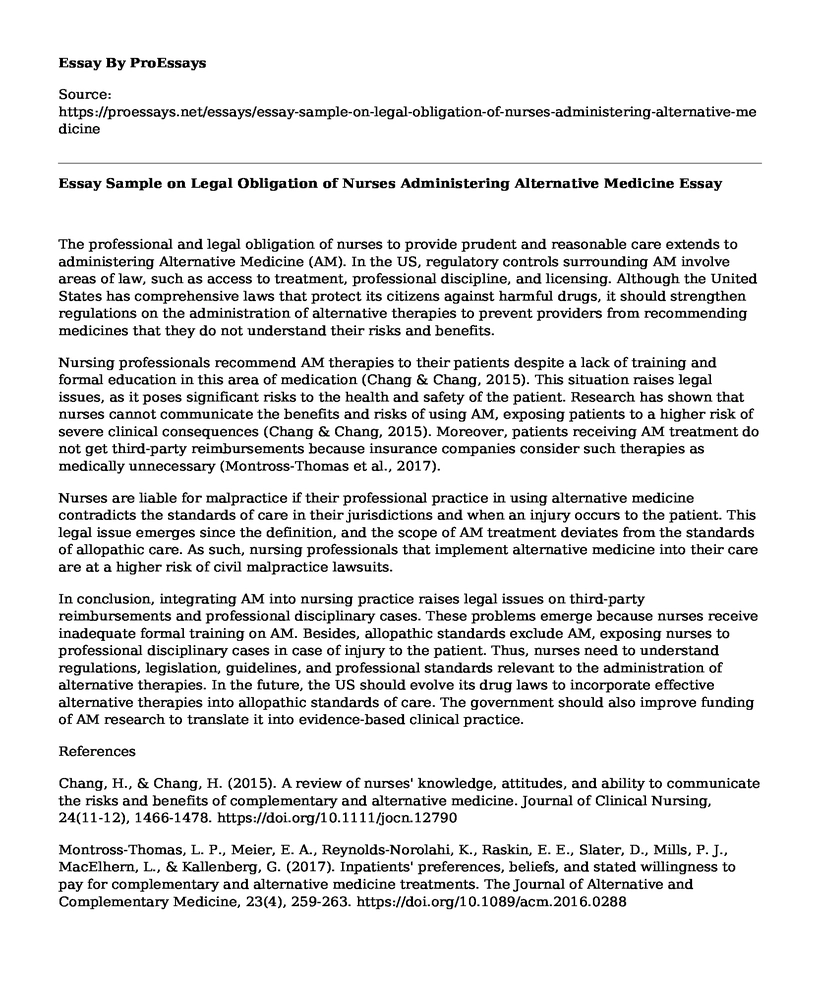The professional and legal obligation of nurses to provide prudent and reasonable care extends to administering Alternative Medicine (AM). In the US, regulatory controls surrounding AM involve areas of law, such as access to treatment, professional discipline, and licensing. Although the United States has comprehensive laws that protect its citizens against harmful drugs, it should strengthen regulations on the administration of alternative therapies to prevent providers from recommending medicines that they do not understand their risks and benefits.
Nursing professionals recommend AM therapies to their patients despite a lack of training and formal education in this area of medication (Chang & Chang, 2015). This situation raises legal issues, as it poses significant risks to the health and safety of the patient. Research has shown that nurses cannot communicate the benefits and risks of using AM, exposing patients to a higher risk of severe clinical consequences (Chang & Chang, 2015). Moreover, patients receiving AM treatment do not get third-party reimbursements because insurance companies consider such therapies as medically unnecessary (Montross-Thomas et al., 2017).
Nurses are liable for malpractice if their professional practice in using alternative medicine contradicts the standards of care in their jurisdictions and when an injury occurs to the patient. This legal issue emerges since the definition, and the scope of AM treatment deviates from the standards of allopathic care. As such, nursing professionals that implement alternative medicine into their care are at a higher risk of civil malpractice lawsuits.
In conclusion, integrating AM into nursing practice raises legal issues on third-party reimbursements and professional disciplinary cases. These problems emerge because nurses receive inadequate formal training on AM. Besides, allopathic standards exclude AM, exposing nurses to professional disciplinary cases in case of injury to the patient. Thus, nurses need to understand regulations, legislation, guidelines, and professional standards relevant to the administration of alternative therapies. In the future, the US should evolve its drug laws to incorporate effective alternative therapies into allopathic standards of care. The government should also improve funding of AM research to translate it into evidence-based clinical practice.
ReferencesChang, H., & Chang, H. (2015). A review of nurses' knowledge, attitudes, and ability to communicate the risks and benefits of complementary and alternative medicine. Journal of Clinical Nursing, 24(11-12), 1466-1478. https://doi.org/10.1111/jocn.12790
Montross-Thomas, L. P., Meier, E. A., Reynolds-Norolahi, K., Raskin, E. E., Slater, D., Mills, P. J., MacElhern, L., & Kallenberg, G. (2017). Inpatients' preferences, beliefs, and stated willingness to pay for complementary and alternative medicine treatments. The Journal of Alternative and Complementary Medicine, 23(4), 259-263. https://doi.org/10.1089/acm.2016.0288
Cite this page
Essay Sample on Legal Obligation of Nurses Administering Alternative Medicine. (2023, Apr 24). Retrieved from https://proessays.net/essays/essay-sample-on-legal-obligation-of-nurses-administering-alternative-medicine
If you are the original author of this essay and no longer wish to have it published on the ProEssays website, please click below to request its removal:
- Public Health in the Prevention of Diabetes Essay
- The Pathophysiology of Atherosclerosis, and Hypertension, and Their Current Treatment Regimens
- Essay Sample on Congestive Heart Failure Readmissions
- Alberta Project APPLE Schools: A Health Promotion Program - Essay Sample
- Essay on COVID-19: Global Pandemic Spreads Fast and is Highly Contagious
- Paper Sample on The Proposed Plan for Diabetes Self-Management
- Essay Example on Benner's Competency Assessment







